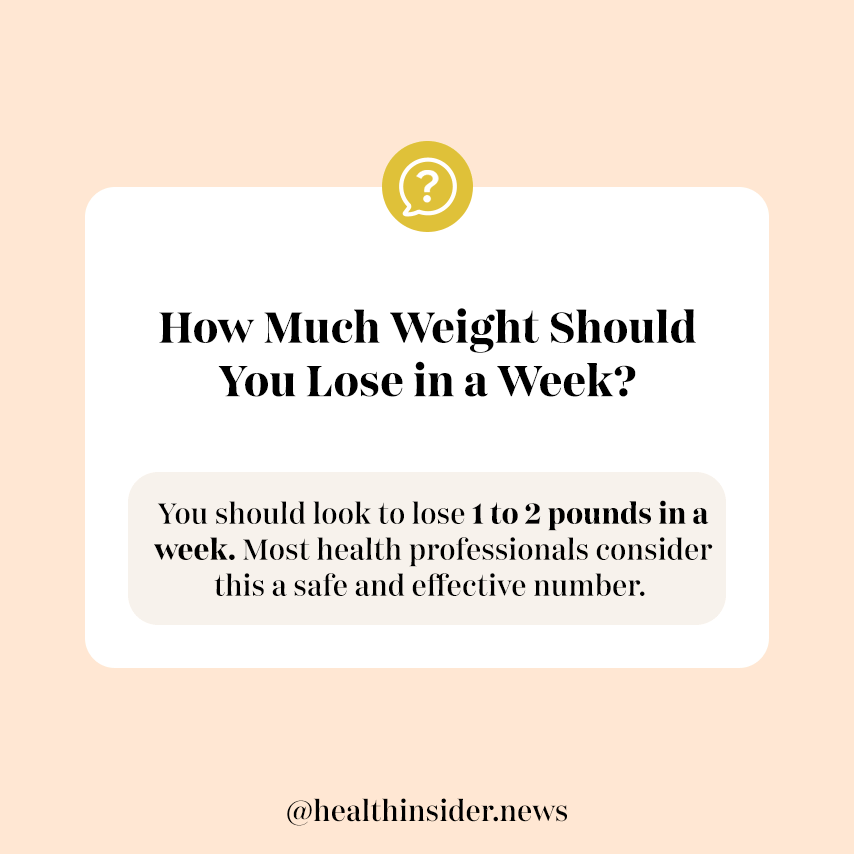How Much Weight Can You Lose in a Week? A Dietitian Explains

Rapid weight loss is a trending topic.
People are always looking for quick tricks to shed excess pounds as fast as possible.
Losing weight is a positive action if you are carrying extra pounds. It can reduce health risks, balance your blood pressure, and boost overall health.
With the number of weight loss programs and fad diets popping up all over the internet, it’s no wonder people are willing to try almost anything.
Although many of these methods can reduce fat in the short term, they are not sustainable in the long term.
Healthy weight loss is achieved through commitment, self-control, and safe methods.
While slow weight loss sounds unappealing, steady weight loss is the recommended route for long-term weight loss.
This article explores safe weight loss and tips for losing body weight quickly.
How Much Weight Should You Lose in a Week?
As an average, you should look to lose 1 to 2 pounds in a week. Most health professionals consider this a safe and effective number, including the CDC.

Advertisement
Anything more than this moves into the danger zone.
While the big question centers around how much weight you can lose in a week, the real question to turn your focus to is how much weight you should lose in a week.
Your body needs time to lose weight. It’s a transition that should be done gradually to avoid any adverse effects.
A long list of variables determines how much weight you can physically lose. Among others, factors like your current body weight, activity level, and sleep routine impact the outcome. There is no clear-cut answer.
While the disappearance of several pounds might bring instant gratification, it is not a practical solution.
Extreme measures like mass calorie restriction and intense exercise will leave you worn out. It’s impossible to keep it up for long periods. When you return to your usual routine, you risk gaining even more weight than your starting weight.
It’s worth noting, too, that fluid loss can make your weight fluctuate. Most of the weight loss in the initial stages is water weight. Keep this in mind as you weigh yourself.
Why Is It Bad to Lose Weight Too Quickly?
Rapid weight loss is harmful for various reasons.
Burning fat extremely quickly might initially seem like an outstanding achievement. But the bubble soon bursts.
Significant weight loss in days or weeks is problematic and can lead to several health issues.
Here are 3 negative effects to consider before losing weight too quickly.
#1 Yo-yo effect
The yo-yo effect, yo-yo dieting, or weight cycling, is the term given to describe the vicious cycle of losing and regaining weight. In the way that a yo-yo moves up and down, the motion becomes repetitive.
The yo-yo effect is typically a result of crash dieting and excessive calorie restriction.
The constant back-and-forth changes are detrimental to your overall health. It can take a physical and psychological toll.
Yo-yo diets can reduce your weight, but only temporarily. You can end up with a higher percentage of body fat, losing more muscle mass, and increasing heart disease risk.
Losing weight slowly and sensibly is the best bid to avoid the dangers of the yo-yo effect.
#2 Side effects
A range of adverse side effects can occur when you drive your body too quickly into weight loss mode.
As you drastically cut down on calories, you’re likely to experience dizziness. Many fad diets reduce your carbohydrate intake so much that your brain can’t function properly, causing dizzy spells.
Dehydration is another common occurrence among dieters. Rapid water weight loss can cause several adverse effects, including muscle cramps and headaches.

According to the American Heart Association (AHA), dehydration and nutritional deficiencies can trigger your blood pressure to drop, causing dizziness.
Fatigue results from extreme tiredness, and it’s common among fad dieters as you force your body through exhaustive measures. With restrictive eating and low-carb diets, your energy levels plummet.
Bad eating habits impact your blood sugar levels, leaving you feeling wiped out. It’s imperative to ensure you eat enough calories to keep your body and brain functioning correctly.
In short, there will always be an impact on your physical health when you suddenly decrease your caloric intake and overexert yourself with intensive exercise.
A weight loss program with slower methods helps to avoid unpleasant feelings.
#3 It’s bad for your mental health
It’s crucial to begin a weight loss journey with a healthy mindset.
An irresponsible weight loss plan not only takes its toll on your physical well-being – your mental health suffers the consequences, too.
While you will likely feel better about yourself once you’ve lost weight, the journey can be a burden.
With slower weight loss, you have the chance to adjust to your body’s changes naturally. When you do it too quickly, you risk distorting your body image.
Quickly altering your body through weight loss can become addictive. It can lead to eating disorders and obsessive behavior over losing weight.
Yo-yo dieting has been linked to depression, as the repetitive success and failure of weight management impacts your mood.
Ultimately, it’s impossible to handle the side effects associated with a fast weight loss program without impacting your mental health.
5 Tips on How to Lose Weight Fast
It is possible to lose weight fast. However, only one to two pounds in a week is a safe weight loss goal.
Here are 5 health tips to lose weight faster:
#1 Eat real food
A non-negotiable way to lose weight and move toward better health is to focus on your diet.
Diet change is essential. Even small changes can make a big difference to your weight loss journey, whether swapping sugary snacks for fruit or choosing water over coffee with sugar.
Eating a range of healthy and nutrient-dense foods will power your body with energy without adding extra body fat.
To create a calorie deficit, you need to burn more calories than you take in. But even if you are getting plenty of physical activity, you should still avoid unhealthy foods.
Focus on your protein intake to lose fat while building and maintaining muscle mass. Good protein sources include lean meats, fish and seafood, eggs, yogurt, beans, and pulses.

Whole foods offer optimum health benefits, like fruits and vegetables, whole grains, nuts, and seeds.
If you want to reduce your waistline, a top health tip is to cut out refined foods.
Refined foods are highly processed that offer little to no nutritional value, as any nutrition content has been removed. Refined carbs include sugary breakfast cereals, white bread, white rice, white pasta, pastries, and other sweet desserts.
Processed foods tend to contain high salt, sugar, and fat levels. It means more calories, which you want to avoid.
Refined food is also associated with increased health risks, such as cardiovascular disease.
#2 Get more sleep
Many people don’t consider sleep a priority. With busy lives and a social pressure to make every day as productive as possible, an early night doesn’t seem an option.
But did you know that a good night’s sleep can help you lose weight?
When you’re sleep-deprived, your ghrelin levels rise, making you feel hungrier. Your body craves carbs for energy, and you’re more likely to make bad food choices when you’re tired.
Some studies suggest that a lack of sleep is linked to weight gain, leading to obesity and other metabolic disorders.

Any healthy weight loss plan requires a good sleep schedule. Try to go to bed at the same time every night, and aim for 7 to 9 hours of sleep.
#3 Stop weighing yourself every day
When you start a weight loss plan, it’s tempting to hop on the scales every minute to see your progress.
For some people, it may be helpful to try out the scales every day.
However, constantly checking in on your weight can be detrimental to some. It’s possible to become obsessive about it. And when the numbers don’t change, you might feel demotivated. It might give you more stress than motivation.
Another negative outcome of weighing yourself several times a day is that the result is not entirely accurate. Throughout the day, your weight fluctuates depending on what time of day it is and what food and drink you have consumed.
Skip the daily weighing and focus on your new lifestyle habits. The last thing you want is your confidence knocked from the reading on a scale.
#4 Liquid calories are also calories
If you’re new to partaking in a weight loss plan, it might come as a surprise that calories are not solely in the products you eat.
For successful weight loss, you need to consume fewer calories all-round, including calories found in beverages.
Drinks can contain more calories than you realize. For instance, sugary drinks like fruit juice and soda are rife with additional calories.
Your morning coffee might seem like a safe and staple part of your diet, but if you’re adding sugar and syrups, you’re increasing your daily calorie intake.
A significant contributor to liquid calories is alcohol. Most alcoholic drinks are created from natural starch and sugar and thus contain multiple calories.
If you’re committed to quick weight loss, cutting out alcohol and other calorie-rich beverages is a no-brainer.
#5 One small step at a time
Perhaps the most important thing to remember when starting weight loss programs is to take small steps.
Trying to lose several pounds in just one week is a battle. You’ll exhaust yourself, and your weight loss goals won’t remain in the long term.
Take your time and make small changes daily, from eating habits to new exercise habits.
You don’t need to force yourself to work out relentlessly every day. Your physical activity can consist of more minor workouts, like walking a specific number of steps a day.
Even ditching the car and walking to work will successfully trigger fat loss over time.

It’s a good idea to get into some routine. Gradually, you can add further physical activity to your week, like strength training and cardiovascular exercise.
Always keep in mind – small steps, big changes.
The Most Effective Way to Lose Weight
As repeatedly mentioned, steady weight loss is the key to keeping weight off.
Slowing down won’t get you your dream body within a week, but it will come eventually.
Aside from the tips mentioned above, many people turn to intermittent fasting to speed up fat loss. It can help with weight management as it increases your metabolic rate.
The consensus is that you consume fewer calories throughout the day with limited opportunities to eat.
If you are interested in fasting to lose weight, there are several fasting methods to choose from. It’s certainly confusing at first and difficult to manage consistently.
DoFasting can help you explore popular intermittent fasting techniques. DoFasting is an app that assists users with fasting for weight loss. There is no gym, supplements, or additional equipment required.

Your Personal Intermittent Fasting App
- Progress tracker and calendar
- Calorie tracker
- More than 5,000 healthy recipes
- Training routines
- Daily motivation and tips
- Water intake targeting
- Daily caloric intake tracker
Follow a consistent plan tailored to your personal needs, including optional exercises and meal plans.
A Word From RD
How much weight you can lose in one week is entirely personal.
There is no standardized goal to reach in such a short amount of time. Although healthcare professionals typically recommend losing no more than one to two pounds.
A smaller goal reduces possible health risks and increases your potential to keep lost body fat from returning.
Instead of focusing on the amount of weight you can lose in the shortest time, we recommend taking your time and allowing your body to transition both physically and mentally.
Adapt your current lifestyle by eating a healthy diet, burning calories through exercise, and getting enough sleep. You will successfully reach your weight loss goals without jeopardizing your overall health in the meantime.
Conclusion
Rapid weight loss is not always the answer. Instead, work on dropping excess weight safely, avoiding the unwelcome effects that losing weight too soon can bring.
Sometimes the most straightforward options are the solution to success. So, make small changes, eradicate bad choices, and await your ideal body weight with patience and a healthy mindset.







Comments (0)